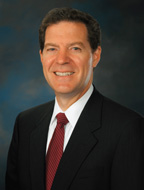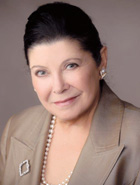
Sam Brownback, Governor of Kansas
If you want to govern effectively, you’d better possess the power of persuasion. Gov. Sam Brownback had more than enough of that commodity to get the Kansas Legislature on board with a dramatic overhaul of the state’s income tax code a year ago—and then to double down on that bet this year with additional cuts. Those will eventually drop the levy by 40 percent, from its original 6.5 percent on taxable earnings to 3.9 percent in 2018. It’s a bold step that has pushed Kansas into the fore of a regional discussion over the way states should configure tax policies to promote long-term economic growth.
Rebuilding a sclerotic tax structure crafted bill by bill, exemption by exemption, over decades, is akin to reconfiguring a biplane into a Stealth fighter in mid-flight: There’s a certain measure of gravitational peril involved. But to critics, Brownback has a simple response: “The other side,” he says, “would rather stay on the course we were on, with a 30-year population deficit and 10 years of real private- sector job loss.”
A year after he set the Kansas tax policy in motion, similar conversations were taking place in the statehouses of Oklahoma, Nebraska and Missouri, with calls to match the Sunflower State’s audacity. Even if they do, Brownback says, there will be no need for Kansas to engage in further one-upsmanship: “We would be an economic powerhouse as a region,” he says, rivaling the experience of Southern states or the Mountain West. “The problem in Kansas is, we haven’t had enough start-up businesses,” he says. “They’re inherently risky, and a lot will fail, but you need that high level for the churn, and some will succeed.” And when they do, he says, “then we will come up with the next Garmin or Cerner.”
The metrics—given time—will prove him right, he’s convinced. He looks no further than the recent jobs report that showed Kansas counties near Kansas City generating 7,300 jobs the previous year—while the Missouri side lost 400. Or at figures showing 2012 as a record year for business start-ups in Kansas. But is there time to accrue enough success metrics to bolster a 2014 re-election bid? “It is a tight window,” he acknowledges, “but we could have stayed on the same path we were on. My argument is, is that what you want? More decades of slow decline?”
The 56-year-old has been the state’s secretary of agriculture and a former U.S. representative and senator who took his shot at the White House in 2008, before shuttering his campaign for lack of funds. When asked about future national ambitions, he simply notes that he and his wife, Mary, are raising five children, they’re happy—and they’re “glad to be back in Kansas.”

Shirley Helzberg, philanthropist
You can make a pretty good case that Shirley Helzberg is Kansas City’s most prolific champion of civic causes. Google her to verify that, because we couldn’t begin to list them all here. Suffice to say, she’s been a part of almost every important community cause over the past half-century, with service on behalf of Starlight Theatre and the Kauffman Center for the Performing Arts, the Heart of America Shakespeare Festival and the Arts Council of Metropolitan Kansas City, and, of course, living out a deep passion for the Kansas City Symphony. There’s even a fountain bearing her name in the City of Fountains.
Now that’s a community activist for you. The inspiration for such deep engagement? “If you change one person’s life,” Helzberg says, “you change the world.” There’s a certain kind of power in that philosophy, a philosophy that says don’t just get involved, but do so by taking prominent roles to promote the causes dearest to you. “Leadership is earned, not granted,” she says. “If we care deeply, believe in the cause or organization, share our passion with other like-minded individuals, work tirelessly and inspire others, then leadership falls into place.”
As a world view, it is not without risks. “Sometimes, you do have failures,” she says, “but you build on that and your work becomes stronger. Many of us started with the tasks that were not always the most rewarding, but we learned from them, worked hard and did the best job possible. Ultimately, we were asked to have more responsibility, and it goes onward from that point.”
The wife of a true entrepreneurial success story, Barnett Helzberg, she was able to take lessons from building a national jewelry-store chain and apply them to her personal life. “It was a great inspiration for me to have close relationships with many of the executive team members,” she recalls. “It seemed imperative to me that the resources earned must be given back. The more resources we enjoyed, the more we were able to give back.”
That often required in-depth research before championing a cause. “The due diligence required to decide where to put my energies has been a long process for most of my work,” she says. But she’s absolutely convinced of the economic value of the arts—hence her 18 years as president of the symphony—and a thriving core for the metropolitan area: “My business background tells me how important it is to have a healthy, vibrant Downtown, and that certainly has influenced my interest and work in the redevelopment of some important Downtown properties,” she said.
While the symphony will always be nearest her heart, the work that may have the greatest long-term impact is the role she played in creating the University Academy Charter School, to address in some meaningful way the deficiencies of urban K-12 public education. She hopes to be remembered not with her name on the building, “but by those individuals who will achieve success and their children and grandchildren who will achieve success. It is the ripple effect.”